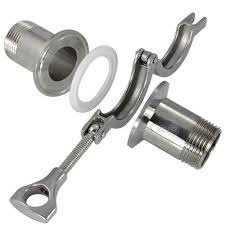
TC Ferrules
A TC ferrule, also known as a Tri-Clover ferrule, is a crucial component in sanitary piping systems. It's a type of sanitary fitting that provides a secure, hygienic, and leak-proof connection, particularly in industries where cleanliness is paramount.
Here's a breakdown of what TC ferrules are and their key characteristics:
Function: The primary purpose of a TC ferrule is to provide a standardized flanged end on a pipe or vessel. This flange allows for a secure connection with other TC fittings using a TC clamp and gasket. The other end of the ferrule is typically designed to be butt-welded to a pipe or vessel, creating a permanent, seamless joint.
Applications: Due to their hygienic design, TC ferrules are widely used in a variety of industries, including:
Food and Beverage: Breweries, dairies, and other food processing plants.
Pharmaceuticals and Biotechnology: Where maintaining a sterile environment is critical.
Cosmetics and Personal Care: For processes that require clean connections.
Chemical Processing: In applications requiring corrosion-resistant and sanitary connections.
Materials: TC ferrules are almost exclusively made from high-grade stainless steel, most commonly SS 304 and SS 316/316L. These materials are chosen for their excellent corrosion resistance, durability, and non-reactive properties, which are essential for maintaining the purity of the products being transported.
Types: There are several types of TC ferrules, each designed for specific applications:
Short Weld Ferrules: Used in applications where space is limited.
Long Weld Ferrules: Provide more space for welding, which is beneficial for orbital welding and creating a more robust connection.
Reducing Ferrules: Used to connect pipes of different diameters.
Tank Ferrules: Heavier-duty ferrules designed for use on tanks and vessels, especially those under higher pressure.
Roll-on/Expansion Ferrules: Designed to slide over the existing tube and then be welded, which differs from the standard butt-weld style.
A TC ferrule, also known as a Tri-Clover ferrule, is a crucial component in sanitary piping systems. It's a type of sanitary fitting that provides a secure, hygienic, and leak-proof connection, particularly in industries where cleanliness is paramount.
Here's a breakdown of what TC ferrules are and their key characteristics:
Function: The primary purpose of a TC ferrule is to provide a standardized flanged end on a pipe or vessel. This flange allows for a secure connection with other TC fittings using a TC clamp and gasket. The other end of the ferrule is typically designed to be butt-welded to a pipe or vessel, creating a permanent, seamless joint.
Applications: Due to their hygienic design, TC ferrules are widely used in a variety of industries, including:
Food and Beverage: Breweries, dairies, and other food processing plants.
Pharmaceuticals and Biotechnology: Where maintaining a sterile environment is critical.
Cosmetics and Personal Care: For processes that require clean connections.
Chemical Processing: In applications requiring corrosion-resistant and sanitary connections.
Materials: TC ferrules are almost exclusively made from high-grade stainless steel, most commonly SS 304 and SS 316/316L. These materials are chosen for their excellent corrosion resistance, durability, and non-reactive properties, which are essential for maintaining the purity of the products being transported.
Types: There are several types of TC ferrules, each designed for specific applications:
Short Weld Ferrules: Used in applications where space is limited.
Long Weld Ferrules: Provide more space for welding, which is beneficial for orbital welding and creating a more robust connection.
Reducing Ferrules: Used to connect pipes of different diameters.
Tank Ferrules: Heavier-duty ferrules designed for use on tanks and vessels, especially those under higher pressure.
Roll-on/Expansion Ferrules: Designed to slide over the existing tube and then be welded, which differs from the standard butt-weld style.
